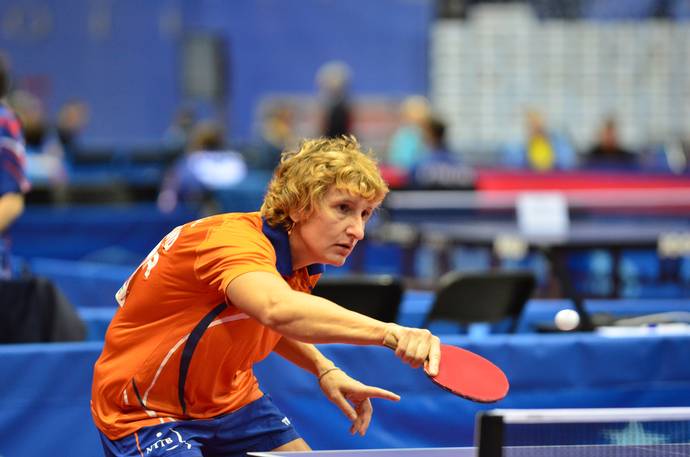"Don't be so defensive." These words, or similar sentiments, are almost invariably spoken by someone who is verbally attacking you. This classic victim-blaming strategy is used so often, the very concept of defense has been smeared with a negative connotation. As a result, almost everyone has been gaslighted into thinking that there is something wrong with defending yourself. Elena Timina, on the other hand, never drank this particular brand of Kool-Aid. Born in 1969 Moscow, she was likely never even temped by any such capitalist confection until she was old enough to know better. Instead, she grew up to be a brilliant defender, not on the pitch or in the courtroom but 10 or 15 feet back from a table tennis table. Her first major international triumph came in 1994 in Birmingham, England. There, Timina and her trusty long pips led Russia to the women's team title at the European Championships. Timina represented the Netherlands at the 2011 in Gdańsk–Sopot, Poland. Then 42 years of age, she met a 16-year-old up-and-comer named Bernadette Szőcs in the deciding match of the final against Romania. This clash of different generations appeared to favor youth, as Szőcs won the first two games. Timina fought back, however, winning the title at deuce in the deciding game. As ever, Timina stuck to her guns, with more tenacious D than a Jack Black superfan's playlist. Interspersed with such career highlights, Timina also played in four Olympics. In 1992, with the recent collapse of the Soviet Union, she played for the European Union. Four years later, she represented her native Russia. In 2008 and 2012, she played for the Netherlands, where she still calls home. In 2017, she began coaching for Ultimate Table Tennis, India's burgeoning league. Leading a team of top players from different countries, Timina saw firsthand the effect of the global arms race for offensive superiority. Modern players are now trained to attack at the earliest opportunity, the "banana flick" being the favored tactic. While everyone knows how to attack, many struggle both on defense and against defenders. Now, Timina is worried that the dearth of defenders is to the detriment of the sport's development. "Indian players were not confident when they play against them," says the player-turned-coach. "Their level was not as good against defensive players. The only way to defeat them is to practice against them." Timina looks to the tactics of the table tennis powerhouses in East Asia. "In China, every Club has a minimum of one or two defensive players. There are special coaches working on defenders in China. It is more or less the same in Japan and Korea. But not much outside these countries," she observes. Her advice to coaches is to train children in the lost art of chopping, both for their own advantage and to improve the biodiversity of the game. "You’ll have to tell him/her how special he/she is and make him/her proud that he is one among the very few to take up defense," says Elena Timina to her fellow coaches. "Motivation is the key." In other words, tune out all the haters and manipulators. Be defensive. Be very defensive.
More at Sportstar
